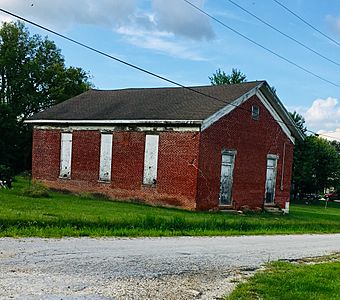Northern Methodist Episcopal Church of Clarksville facts for kids
Quick facts for kids |
|
|
Northern Methodist Episcopal Church of Clarksville
|
|
 |
|
| Location | 309 Smith St., Clarksville, Missouri |
|---|---|
| Area | less than one acre |
| Built | 1866, 1915 |
| Architectural style | Greek Revival |
| MPS | Clarksville MPS |
| NRHP reference No. | 91000487 |
| Added to NRHP | May 9, 1991 |
The Northern Methodist Episcopal Church of Clarksville, also known as Bryant Chapel AME, is a very old and important church building. It is located at 309 Smith Street in Clarksville, Missouri, which is in Pike County, Missouri.
This church was first built in 1866. It was later updated and changed in 1915. The building is a single story and shaped like a rectangle. It is made of brick.
What is Greek Revival Style?
The church is built in a style called Greek Revival. This means its design was inspired by ancient Greek temples. It often includes tall columns and a triangular roof shape at the front, like the Parthenon. This style was very popular in the United States in the 1800s.
A Special Church for the Community
This church is part of the African Methodist Episcopal (AME) tradition. The AME Church is a Christian church that was founded by African Americans. It has played a very important role in the history and community life of African Americans.
Listed as a Historic Place
Because of its history and special architecture, the Northern Methodist Episcopal Church of Clarksville was added to the National Register of Historic Places in 1991. This is a list of buildings, sites, and objects that are important in American history. Being on this list helps protect the building so it can be enjoyed for many more years.
 | Anna J. Cooper |
 | Mary McLeod Bethune |
 | Lillie Mae Bradford |



